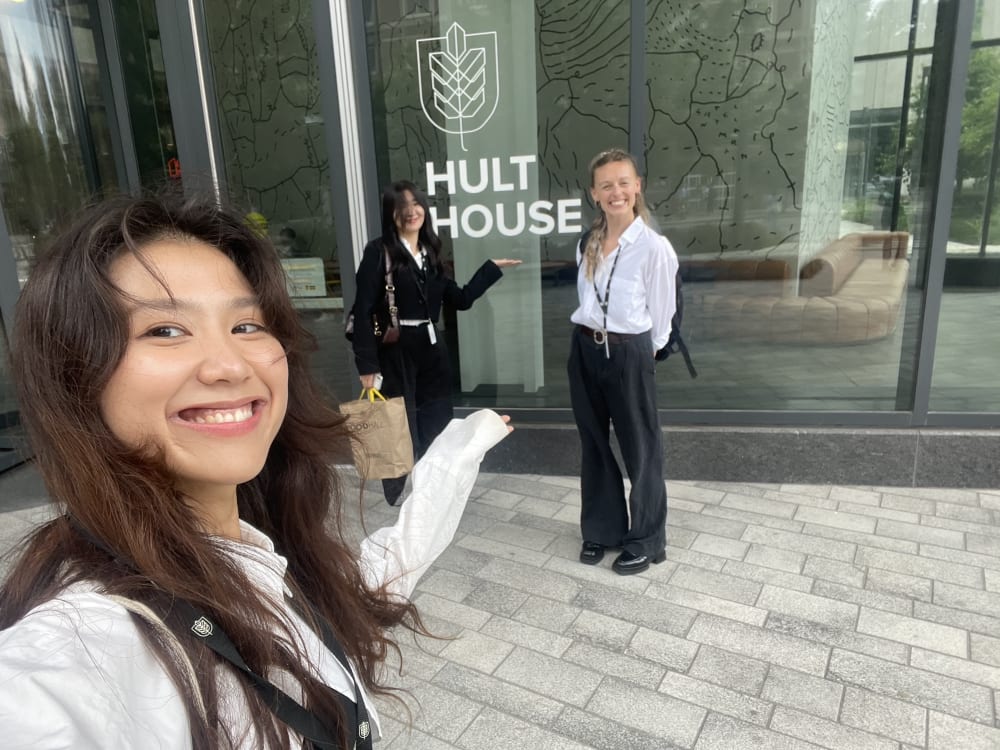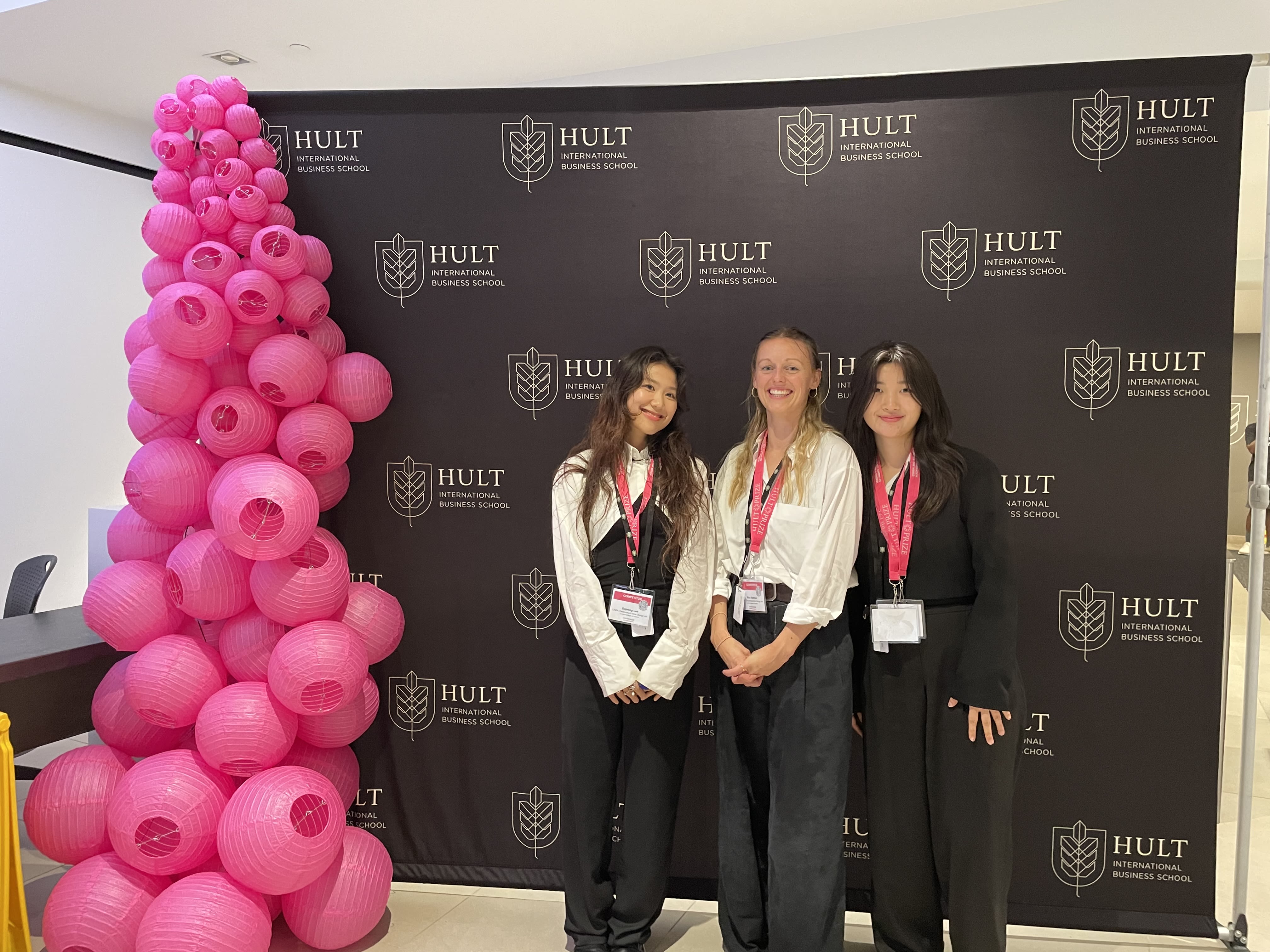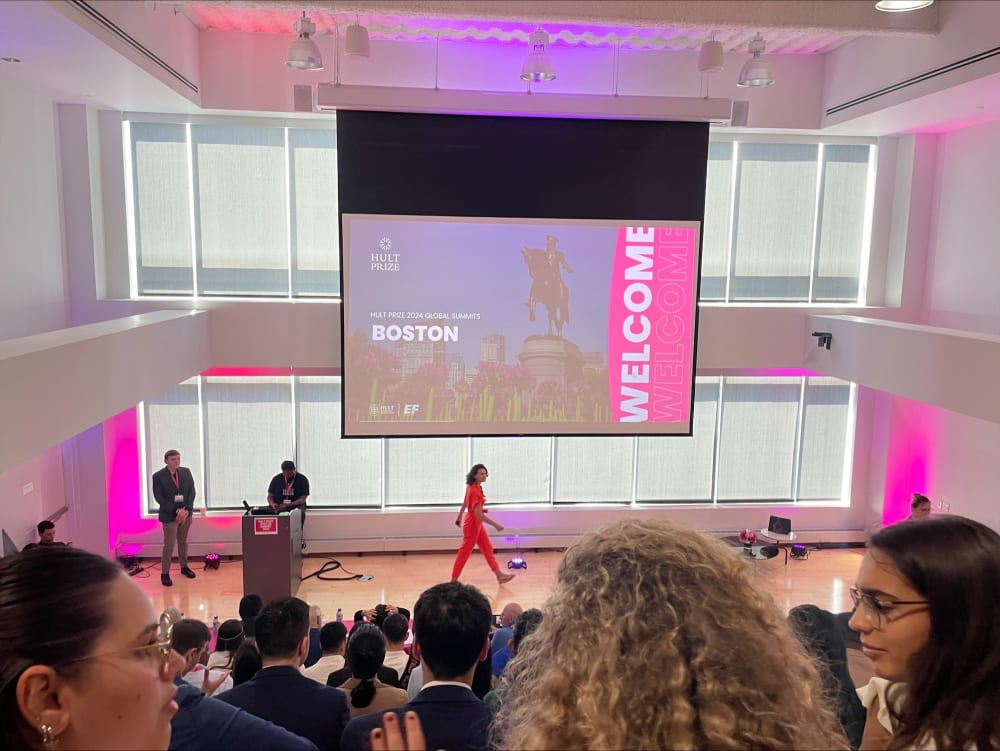
LCF students win first runner-up award at the 2024 Hult Prize

- Written bySorcha Cheevers
- Published date 07 August 2024

The Hult Prize is an annual competition that challenges young people around the world to solve the planet's most pressing issues through social entrepreneurship and this year four London College of Fashion (LCF), UAL students took up this challenge. Dajeong Lee, Nina Redman, Dagyeong You from MA Fashion Futures, and Radhika Madhusoodanan, MSc Applied Psychology in Fashion, worked together to create a solution to the problem of textile waste by retailing and repurposing it for use to customers. The group’s proposal, ‘The DADA venture’, aims to pioneer sustainable innovation for the fashion industry by utilising advanced techniques such as CL3D, Laser cutting and lidar 3-D body scans to repurpose textile waste into bespoke garments.
After competing at the Hult Prize Boston Summit on 14-15 June 2024 the team achieved the first runner-up award out of over 94,000 teams worldwide. The LCF students were one of the 390 teams selected, with only 34 chosen for the Boston Summit.
We recently caught up with Radhika, Dajeong, Nina, and Dagyeong to hear more about their proposal, the DADA venture, and highlights and challenges of the competition.
Congratulations on achieving the first runner-up award for the Hult Prize 2024! How does it feel to have your work acknowledged in this way?
It feels incredibly rewarding to have our work recognised in such a prestigious international business competition. The recognition validates our hard work and dedication to The DADA venture. Initially, we faced a setback at the Boston summit due to time constraints during our pitch. However, we were given a second chance through an hour-long virtual interview, which was unexpected and greatly appreciated. This opportunity has given us hope and confidence that our idea to create systemic changes in the fashion industry for a more sustainable future is achievable. The acknowledgement has motivated us to continue pursuing our mission with even greater enthusiasm.
Tell us about the competition – how did it come about and what were you required to do? Tell us about your proposal, The DADA venture.
The Hult Prize is an annual competition that challenges young people to solve the world’s most pressing issues through social entrepreneurship. This year’s theme was the United Nations Sustainable Development Goals (SDGs), which happened to align with my master’s project. We were required to develop a viable business plan addressing these goals. The DADA venture originally started with a pre-startup business programme in South Korea in 2021, focusing on upcycling unmarketable clothing from charity shops using 3D CAD software and natural dyes. This idea evolved to incorporate a more comprehensive approach, addressing sustainability within the industry across five dimensions: environmental, social, cultural, aesthetic, and economic.
With a decade of experience in the fashion industry, I aimed to tackle textile waste by integrating digital technologies and proposing a virtual made-to-measure fashion system. Our circular model, involving partnerships with creative communities, supports several SDGs, including SDG 12 (Responsible Consumption and Production), SDG 9 (Industry, Innovation, and Infrastructure), and SDG 8 (Decent Work and Economic Growth). We also promote creativity through workshops on mending and upcycling, supporting SDG 11 (Sustainable Cities and Communities), SDG 17 (Partnerships for the Goals), SDG 13 (Climate Action), and indirectly SDG 14 (Life Below Water) and SDG 15 (Life on Land).
For the competition, we submitted our business plans, presentation deck, and pitch video. After being selected for the Boston summit, we prepared a 4-minute pitch and a 4-minute Q&A session. I also created digital and physical prototypes for our virtual made-to-measure system. Following our second chance round, we updated our business deck with insights from the summit and prepared for the hour-long interview.

Were there any aspects of the process that you found challenging? Did you learn anything new?
Initially, I found it challenging to refine the DADA business idea to communicate it clearly and concisely, given its complex and holistic nature. Within the team, the most challenging part was time management. As we were all pursuing our master’s degrees simultaneously, coordinating schedules was quite difficult. And one of our teammates couldn’t attend the summit due to visa issues, which was frustrating and disappointing.
Out of the team, changing the flow of thinking from fashion to business was the most challenging part. Since none of us had a business background, all the numerical calculations encountered while proving the feasibility were overwhelming, which made it challenging to meet the competition’s criteria but also educational.
Explaining fashion-related terms and ideas to the unfamiliar public was also challenging. At the first pitch, we focused on compressing the whole ideas we developed as much as possible in time, but after getting feedback from the judges and colleagues, we learned how to focus on important things and organise the flow of the story and made a successful second pitch. Exposing us to diverse social entrepreneurs from various industries was a significant learning experience.
What were the highlights of being crowned runners up of the competition?
One of the highlights was presenting our proposal to a panel of esteemed judges and receiving their constructive feedback. It was incredibly gratifying to have our hard work and innovative ideas recognised on such a prestigious platform. Networking was another significant highlight; we met a diverse group of social entrepreneurs from around the globe, which opened numerous opportunities for future collaborations and partnerships.
Being runners-up has also provided us with greater visibility and credibility, attracting interest and support from potential investors and stakeholders who share our vision for a sustainable fashion industry. The feedback and insights we gained from the judges and fellow competitors have been invaluable in refining our business model and strategy.
Additionally, the experience of attending the Boston summit itself was a highlight. We were inspired by the passion and creativity of other participants, which reinforced our commitment to making a positive impact. The recognition has also boosted our team’s morale and confidence, encouraging us to push the boundaries of what we can achieve with The DADA venture.
